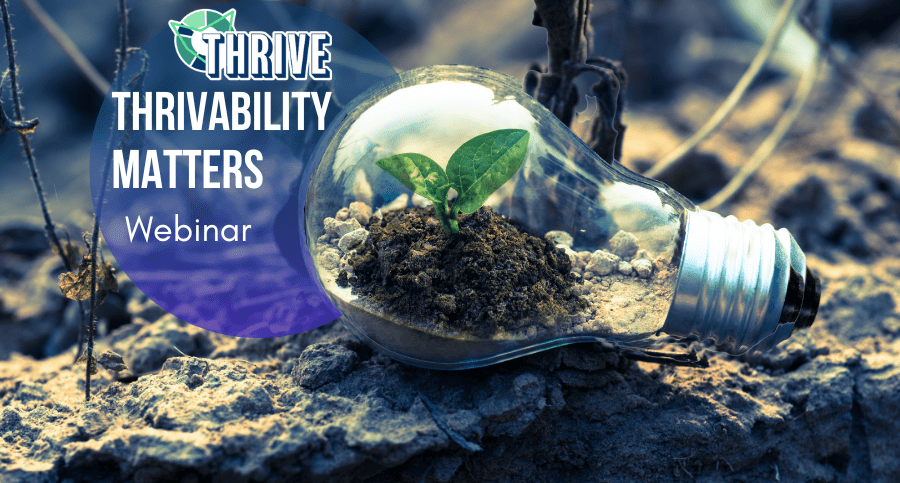The THRIVE project would like to extend warm gratitude to Rowan Blizzard for his presentation at the February Thrivability Matters webinar. The focus of this webinar was the United Nations SDG12 – Ensure sustainable consumption and production patterns. Rowan presented on his forte – sustainability in housing and construction.
About the Speaker

Rowan grew up in small rural communities and was encouraged to question the status quo in a farming setting. With very practical skills and a yearning for better practices, Rowan moved into North Queensland in the early 1990s. In his professional life he was highly involved in the community first responses to cyclones Larry and then Yasi. In this time, he developed awareness around some of the impractical and remote systems that in effect rule our lives. While representing manufacturers and suppliers across the North Queensland region, Rowan started to seek out like-minded professionals to set about demonstrating and making changes for better housing outcomes. In this role, Rowan began to formulate the Innovation House framework.
Rowan is currently a solution seeker for Innovation House Australia with proven experience across a wide range of areas including sales, service, technical, and management. He has a passion for high-performance building practices with expertise in a vast range of building products and materials. Our Thrivability Matters Podcast with Rowan on “Building Inclusive and Sustainable Cities” can be found here.
The difficult path
Rowan began with a statement – ‘today is not the day for easy answers.’ This is a reoccurring theme throughout the webinar and is a strong approach to sustainability. We all like easy, but saving humanity needs us to be challenged to change and change is difficult. Rowan made no apologies for posing some tough questions.
This presentation was specifically informed about Rowan’s experiences in Australian construction. These are wide, covering delivery and sale of residential homes, project homes, performance homes. Affordable and aged care homes, and anything in between.
But at the end of the day, Rowan’s vast experience is tied to the Australian climate. Compared to many countries around the world, life in Australia is good. There are relatively limited extreme weather conditions. In Australia, there are many ‘easy answers’ for sustainable housing – quick and easy solutions that can help, but often make little difference in the big picture. These include:
- Battery usage to flatten power peak and have off grid power
- White roofs to reduce heat
- Solar power systems
- Higher star-rating homes
- More regulations and a stricter building code
These solutions are about waste reduction and do little to break the existing habits that are responsible for large-scale environmental destruction.
Battery-stored power can be viable for houses or housing blocks. Solar systems have become increasingly commercially viable with government incentives. Planting vegetation or having a white roof can help to cool the house. While these are good things, they are not miracle solutions. In Australia, there is a household star rating system designed to measure the sustainability of a house. These ratings have increased over time, but newly built houses are not constantly performing better.
If we focus on one very specific solution, we may be missing the other benefits available in the building process which may be more cost-effective and less environmentally damaging than standard options. Just as different people require different housing, different houses require different approaches to sustainability.
Consumers can de-risk change
Despite being a first-world country, Australia ranks poorly in climate action. Rowan believes that if we hold commerce to account and demand they deliver then change is possible. The ethical consumer must read their policies and purchase accordingly. If enough people give a voice the industry will listen. The construction industry wants to change but money often speaks louder than words. Research is key in order to avoid greenwashing.
Superannuation funds that hold large amounts of funds in companies demand an audience and input to company directions. With the right research and selection, your super fund can help here too.
Commerce is always moving and consumers vote by supporting evolving products. It’s nice to wait for the perfect product but for things to advance we need to be willing to take a chance on new ideas and support them. These projects may not be perfect, and may still contain deep flaws, but if they are pushing for real change rather than easy answers, these ideas deserve to be supported.
Where we are today?
Today there have 10 million homes in Australia – Households consume 29 percent of global energy. This equates to 21 percent of the world’s CO2 emissions, just one of the many environmental concerns that come from construction. For this to reduce there needs to be more honesty and discussion about housing, and the construction industry needs to be held to account.
Despite this, there are some great examples of innovation and forward-thinking. Creating a 10-star home is becoming more achievable, and the pricing gap between this and an average home is decreasing.
Over a house’s lifetime, the occupants’ behaviours can have the largest impact on CO2 emissions. If the house is designed in such a way that functions such as heating and cooling are needed less, this will have a substantial effect. This can be more efficient – though less of a buzzword – than something like solar.
Rowan’s presentation and conclusion can be seen here.
Conclusion
Rowan reflects that from the black box flight recorder to the bionic ear – Australia has a history of innovation. But for these ideas to come to fruition, the creators had to be supported, even if at first they didn’t succeed. The same can be said for sustainability in construction. We must take personal action in small steps. We can all help to promote bigger questions for our community to discuss together.
Following the webinar, guests were invited to participate in an interactive Q&A session in which Rowan answered questions from the audience.
You can register for March’s webinar here or find out more info here.
If you would like to hear more from Rowan, he was recently featured on an episode of the THRIVE Talks podcast.
Thanks, and do keep on thriving!
SUBSCRIBE TO OUR NEWSLETTER
GOT A QUESTION ON THIS TOPIC?























